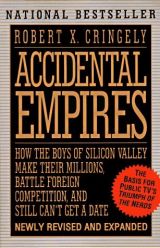


|
Accidental Empires: How the Boys of Silicon Valley Make Their Millions, Battle Foreign Competition, and Still Can't Get a Date (平装)
by Robert X. Cringely
| Category:
Entrepreneurship, Innovation, Business success, Technology, New economy |
| Market price: ¥ 158.00
MSL price:
¥ 148.00
[ Shop incentives ]
|
| Stock:
Pre-order item, lead time 3-7 weeks upon payment [ COD term does not apply to pre-order items ] |
MSL rating:
 Good for Gifts Good for Gifts |
| If you want us to help you with the right titles you're looking for, or to make reading recommendations based on your needs, please contact our consultants. |

|
| |
AllReviews |
1 Total 1 pages 9 items |
|
|
Amazon.com (MSL quote), USA
<2008-02-26 00:00>
Robert X. Cringely manages to capture the contradictions and everyday insanity of computer industry empire building, while at the same time chipping away sardonically at the PR campaigns that have built up some very common businesspeople into the household gods of geekdom. Despite some chuckles at the expense of all things nerdy, white, and male in the computer industry, Cringely somehow manages to balance the humor with a genuine appreciation of both the technical and strategic accomplishments of these industry luminaries. Whether you're a hard-boiled Silicon Valley marketing exec fishing for an IPO or just a plain old reader with an interest in business history and anecdotal storytelling, there's something to enjoy here. |
|
|
Publishers Weekly (MSL quote), USA
<2008-02-26 00:00>
Rich in relevant, entertaining digressions, this breezy but informative history recounts how gifted, maverick "nerds," "hippies" and entrepreneurs like Apple's Steve Wozniak and Steve Jobs invented and developed microprocessors and operating systems into today's volatile, ego-driven, highly competitive personal computer industry, in which ever-changing technical standards propel the market. Info World columnist Cringley charges that the astronomical sales of PCs ($70-billion worldwide in 1990) "both created the longest continuous peacetime economic expansion in U.S. history and ended it." While current dominance by IBM spurs competitors to further research and networking, the author predicts that by the year 2000 single chips will render today's PCs obsolete and that of American technology only software will survive.
Copyright 1991 Reed Business Information, Inc. |
|
|
Library Journal (MSL quote), USA
<2008-02-26 00:00>
Readers of the computer industry journal Info World will recognize Cringely as the weekly columnist who openly solicits industry secrets from readers. Here, he offers an irreverent explanation (he says it's harder to be an explainer than a historian) of the computer culture together with an informative chronology of the major computer companies and the personalities that have shaped the industry. His informal insights presented in a characteristically wry manner will make this a popular book for a wide audience.
- Joseph Barth, U.S. Military Acad. Lib., West Point, N.Y.
Copyright 1992 Reed Business Information, Inc. |
|
|
USA Today (MSL quote), USA
<2008-02-26 00:00>
It has a sense of perspective most books about the high-tech priesthood sorely lack. |
|
|
From Kirkus Reviews, USA
<2008-02-26 00:00>
A savvy observer's witty, wide-ranging audit of the personal- computer industry's ragtag roots, disorderly (albeit dramatic) growth, and competitive future. While InfoWorld columnist Cringely focuses on Silicon Valley, he covers the PC waterfront, from Armonk (home base for IBM) to the Seattle suburbs (where Microsoft is headquartered), with stops along the way in Houston (Compaq) and elsewhere. By his authoritative account, the business dates back to the early 1970's, when Intel introduced a microprocessor device and outlaw engineers used it to build a PC that could be assembled by hobbyists. Although many nerds and junk-food geniuses remained comparatively indifferent to the commercial potential of their creations, Cringely recounts, others did not. Within a few years, aggressive, visionary entrepreneurs like Steve Jobs (co-founder of Apple) and Bill Gates (Microsoft) had set up shop to cash in on a new market, which boomed in earnest with the arrival of Big Blue's initial entry, together with a host of so-called clones; at last count over 40 million PCs have been sold in the US. But, as Cringely makes clear, ``computers die young, but software lives on, nearly forever.'' Thanks to ongoing advances in the state of the circuitry art, he says, new generations of higher-performance PCs, work stations, and allied systems emerge about every 18 months. By contrast, programming has a virtually limitless life span. In addition to producing a high mortality rate among fledgling hardware suppliers, market dynamics have put IBM on a slippery down slope. In the meantime, Cringely predicts, Microsoft could, despite mediocre technology, become a genuine master of the universe because of its prowess at establishing and maintaining industry standards. Nor is Cringely concerned that Japan might dominate the PC/work-station game, with its preoccupation with mass- manufacturing hardware rather than originating perdurable and proprietary software. A lively, informed overview of a consequential enterprise that, for all its volatility, has produced earth-shaking change throughout the Global Village. - Copyright ©1991, Kirkus Associates, LP. All rights reserved. |
|
|
Tom Peters (MSL quote), USA
<2008-02-26 00:00>
A wonderfully readable, acerbic and funny tale of America's most important industry |
|
|
Los Angeles Times (MSL quote), USA
<2008-02-26 00:00>
Cringely writes in a tone that's part Spy Magazine, part Newsweek, and part The Wonder Years. |
|
|
Roger von Oech (MSL quote), USA
<2008-02-26 00:00>
As compelling and entertaining read as Barbarians at the Gate. |
|
|
From the Publisher, USA
<2008-02-26 00:00>
With a new afterword, this national bestseller by "the Liz Smith of Silicon Valley" (Booklist) divulges the quirkily brilliant tale of how-and why-the computer industry works. |
|
|
|
1 Total 1 pages 9 items |
|
|
|
|
|
|